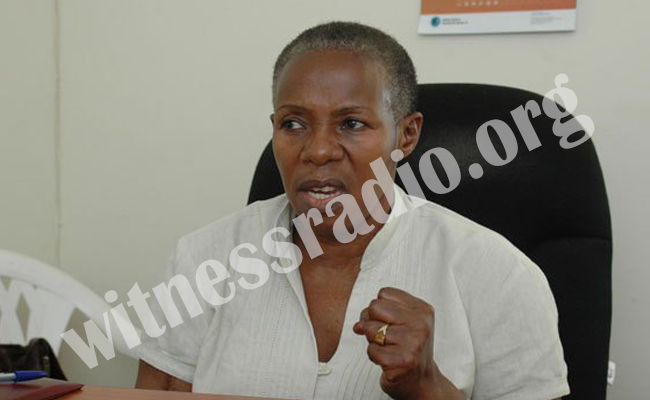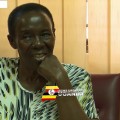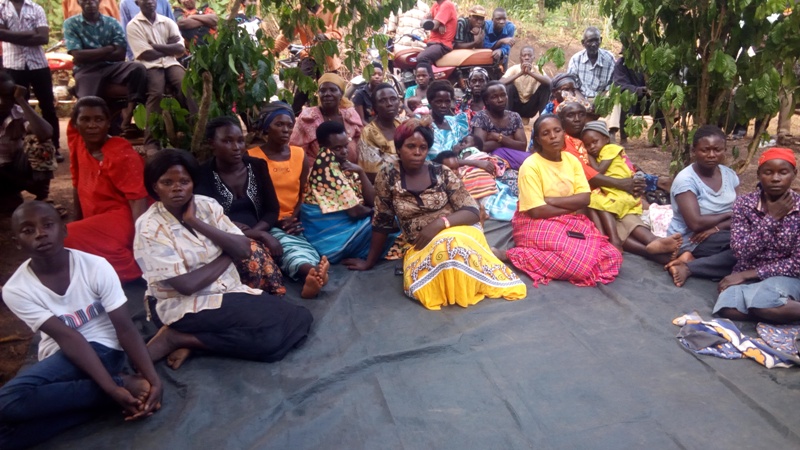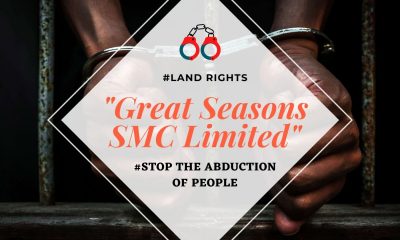By witnessradio.org team
Imagine being assigned by your president to protect the indigenous people’s land and instead target their mineral-rich land; through your office, you hoodwink them to vacate their land before compensation.
It’s now ten years since Gertrude Njuba, a State House Director on Land matters duped and took two (2) square miles natives’ mineral-rich land at Kamalenge, Bukuya sub-county in Mubende district where she spotted gold stones. The land was hosting over 251 families with majority engaged in subsistence farming.
In last July, 2017, Njuba was again named in 12-square mile land grabbing scandal that host the gold deposits in Mubende district. In this particular grab, at least 120,000 families directly survived and lived on the grabbed land. Using the army and police, Njuba violently evicted indigenous people off their land and properties worth billions of shillings including permanent houses were demolished without compensation.
Article 26 (1) stipulates that “every person has a right to own property either individually or in association with others,” and article 26 (2) provides for (i) “prompt payment of fair and adequate compensation, prior to the taking of possession or acquisition of the property.”
Before evicting the poor peasants, Njuba, a director of Anglo-Ugandan Co-operation (AUC) mining ltd, used district public offices including the office of the Resident District Commissioner (RDC) to convince natives to vacate their land willfully before receiving their payment. Natives claim that before the valuation report was out, Njuba made them to sign an understanding agreement outlining a 3% disturbance fees in order to vacate their land faster but even those benefits are yet to be realized. The benefits were expected to come from gold got from their land.
As a sign of commitment to pay everyone’s compensation after leaving their land, Njuba targeted some leaders and paid them less than 10% of their total entitlement, which she has also failed to pay fully. Through their leaders; Enoch Ruyonga, Fabiano Kamuhanda and Alex Kamusiime said, Njuba’s actions are in total breach of the 1995 constitution which prohibits deprivation of property without compensation.
According to the valuations of; V&Q consulting surveyors valuators, Enoch Ruyonga’s properties were valued at Shs 53,500,186 (about $14,861) just got 7,446,721 (about $2,068), Jackson Mukasa valued at Shs 47,496,813 (about $13,193), and paid only Shs 12,000,000(about $3,333) John Kasinzi was valued at 27,104,229 about ($7,528) but just got Shs 7,000,000 (about $1,944)
Others are; Ibrahim Muganga who was valued at Shs 5,816,889 (about $1,615) but just got just 2,077,091 (about $576), Alex Kamusiime was valued at Shs 4,583,735 (about $1,273) and just got Shs 2,000,000 (just $555), Faibano Kamuhanda was valued at Shs 38,802,155 (about $10,778), was paid Shs 11,438,480 (about $3,177) and James Musisi was valued at Shs 3,800,000 (about $1,055), but paid him just 1,000,000 (about $277).
By witnessradio.org team
Imagine being assigned by your president to protect the indigenous people’s land and instead target their mineral-rich land; through your office, you hoodwink them to vacate their land before compensation.
It’s now ten years since Gertrude Njuba, a State House Director on Land matters duped and took two (2) square miles natives’ mineral-rich land at Kamalenge, Bukuya sub-county in Mubende district where she spotted gold stones. The land was hosting over 251 families with majority engaged in subsistence farming.
In last July, 2017, Njuba was again named in 12-square mile land grabbing scandal that host the gold deposits in Mubende district. In this particular grab, at least 120,000 families directly survived and lived on the grabbed land. Using the army and police, Njuba violently evicted indigenous people off their land and properties worth billions of shillings including permanent houses were demolished without compensation.
Article 26 (1) stipulates that “every person has a right to own property either individually or in association with others,” and article 26 (2) provides for (i) “prompt payment of fair and adequate compensation, prior to the taking of possession or acquisition of the property.”
Before evicting the poor peasants, Njuba, a director of Anglo-Ugandan Co-operation (AUC) mining ltd, used district public offices including the office of the Resident District Commissioner (RDC) to convince natives to vacate their land willfully before receiving their payment. Natives claim that before the valuation report was out, Njuba made them to sign an understanding agreement outlining a 3% disturbance fees in order to vacate their land faster but even those benefits are yet to be realized. The benefits were expected to come from gold got from their land.
As a sign of commitment to pay everyone’s compensation after leaving their land, Njuba targeted some leaders and paid them less than 10% of their total entitlement, which she has also failed to pay fully. Through their leaders; Enoch Ruyonga, Fabiano Kamuhanda and Alex Kamusiime said, Njuba’s actions are in total breach of the 1995 constitution which prohibits deprivation of property without compensation.
According to the valuations of; V&Q consulting surveyors valuators, Enoch Ruyonga’s properties were valued at Shs 53,500,186 (about $14,861) just got 7,446,721 (about $2,068), Jackson Mukasa valued at Shs 47,496,813 (about $13,193), and paid only Shs 12,000,000(about $3,333) John Kasinzi was valued at 27,104,229 about ($7,528) but just got Shs 7,000,000 (about $1,944)
Others are; Ibrahim Muganga who was valued at Shs 5,816,889 (about $1,615) but just got just 2,077,091 (about $576), Alex Kamusiime was valued at Shs 4,583,735 (about $1,273) and just got Shs 2,000,000 (just $555), Faibano Kamuhanda was valued at Shs 38,802,155 (about $10,778), was paid Shs 11,438,480 (about $3,177) and James Musisi was valued at Shs 3,800,000 (about $1,055), but paid him just 1,000,000 (about $277).


 NGO WORK2 weeks ago
NGO WORK2 weeks ago
 MEDIA FOR CHANGE NETWORK2 weeks ago
MEDIA FOR CHANGE NETWORK2 weeks ago
 MEDIA FOR CHANGE NETWORK2 weeks ago
MEDIA FOR CHANGE NETWORK2 weeks ago
 MEDIA FOR CHANGE NETWORK2 weeks ago
MEDIA FOR CHANGE NETWORK2 weeks ago
 MEDIA FOR CHANGE NETWORK7 days ago
MEDIA FOR CHANGE NETWORK7 days ago
 MEDIA FOR CHANGE NETWORK1 week ago
MEDIA FOR CHANGE NETWORK1 week ago
 MEDIA FOR CHANGE NETWORK2 days ago
MEDIA FOR CHANGE NETWORK2 days ago
 MEDIA FOR CHANGE NETWORK1 day ago
MEDIA FOR CHANGE NETWORK1 day ago




































